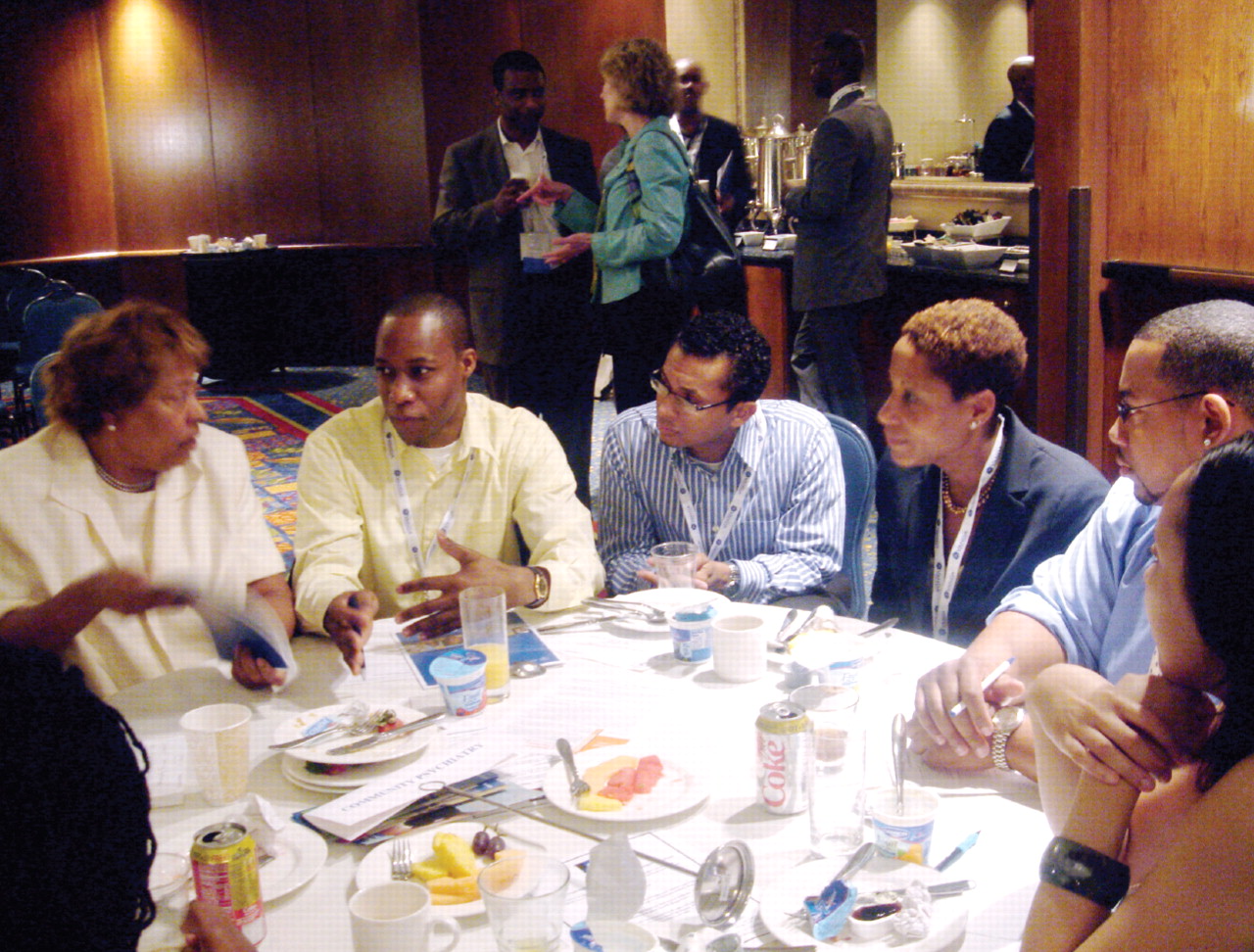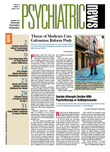Each year, veteran psychiatrists voluntarily take a break from the workshops and continuing education sessions of APA's annual meeting to break bread with aspiring psychiatrists while offering them pearls of wisdom about psychiatry and mental illness.
The tradition continued in May at the 10th annual Minority Mentor Orientation Breakfast of APA's National Minority Mentor's Network (NMMN).
A buffet was served along with camaraderie to a standing-room crowd of 140 participants. Mentees (medical students and psychiatry residents) communed and conversed with mentors (veteran psychiatrists, including APA's Minority Fellowship alumni).
Dauda Griffin, M.D., an African-American psychiatrist, epitomizes the benefits of the breakfast meeting, having participated over the years as both mentee and mentor.
“I have had the pleasure of attending four [National] Minority Mentor Network breakfasts: one as a medical student, two during my adult psychiatry residency, and one during my child and adolescent psychiatry fellowship,” said Griffin. “This meeting is important because it is the forum in which fellows and medical students can hear about the work and interests of senior psychiatrists.”
Annelle Primm, M.D., M.P.H., directs APA's Office of Minority and National Affairs (OMNA), which administers a number of diversity initiatives, including the breakfast.
“This provides an avenue for young people to be inspired to work to gain the knowledge, achievements, and leadership of the mentors,” Primm told Psychiatric News. On the flip side, she said, veteran psychiatrists who volunteer as mentors are “contributing to the professional growth and development of budding psychiatrists, an act that can indirectly help to combat ethnic and racial disparities in mental health status and quality of mental health care.”
Enjoying the 'Spectacle of It All'
“Personally, I enjoy seeing the spectacle of it all—the social chemistry of people meeting and greeting, learning from each other, and exchanging contact information and ideas,” Primm said. “Many professional 'matches' emerge from this, as well as collaborations. This meeting generates a lot of goodwill among APA members, making leaders accessible to young people who might feel uncomfortable about introducing themselves. Coming to the mentorship function reveals that the mentors really care about the future of young people from diverse backgrounds as well as the future of psychiatry, which will need a diversity of leadership.”
APA member and longtime NMMN mentor Francis Lu, M.D., cited this year's breakfast meeting, the eighth he has participated in, as having the largest attendance. “This year we had a very wide distribution of mentors from private practice to academic institutions, from every subspecialty. We also had a significant number of mentors that were mentees in the past and shared how mentorship made a difference in their professional careers,” said Lu.
Among APA leaders in attendance were President Carolyn Robinowitz, M.D., immediate past President Pedro Ruiz, M.D., President-elect Nada Stotland, M.D., Vice President Carol Bernstein, M.D., and Secretary-Treasurer Donna Norris, M.D.
“What is particularly useful about such interactions,” Robinowitz said, “is the opportunity for students and trainees to interact with a broad group of leaders whose experience and vision is beyond their particular school or department, to learn about directions and opportunities in psychiatry, such as in research, care, and education.”
Rewards Are Two-Way Street
Robinowitz pointed out that such enrichment programs also benefit mentors.“ Not only do we have the satisfaction of assisting young colleagues in developing their careers, but we mentors also are invigorated and inspired by their enthusiasm, intellectual curiosity, dedication, and energy.”
It's the kind of focused energy that Lu saw in his reunion that morning with former mentee Rona Hu, M.D.
“She told a very touching story at the breakfast about my mentoring her when she was a resident at UCSF [University of California, San Francisco],” where Lu is a professor of psychiatry. “I had encouraged her and another UCSF resident to visit NIMH with me when we attended the APA fall component meetings when they were APA/SAMHSA Minority Fellows. This inspired her to pursue a research fellowship at NIMH after residency and her research career at Stanford. She in turn is mentoring and supervising medical students and residents, encouraging them to enter psychiatry. I know through my experience with mentoring that it can not only help transform a trainee, but it also helps transform the field of psychiatry, especially concerning diversity.”
Griffin, now a second-year fellow in child and adolescent psychiatry at Emory University School of Medicine, emphasized that the mentor network breakfast “is one of the few opportunities for minority psychiatrists to come together and interact throughout the year. It is so refreshing to see familiar faces and faces that look like mine, because it can be isolating in the frequently less diverse environments in which we work day to day.” But there also “is an opportunity to receive advice unique to being a minority including, doctor-patient issues, professional work environment issues, and social issues that may not be readily available at our respective institutions.”
Lu, Primm, and others also stressed that these breakfast meetings help carry on the legacy of Jeanne Spurlock, M.D., the first director of the Office of Minority and National Affairs, who retired from APA in 1993 and died in 1999.
“She was my mentor,” Lu said. She “encouraged my participation in APA governance as she did for countless ethnic and sexual minority and women residents and early career psychiatrists.”
So, what might Jeanne Spurlock, think about the health of the minority mentors network program and orientation breakfast today?
“I believe Dr. Spurlock would be overjoyed at the growth and diversity of the mentor network,” said Marilyn King, who manages APA's minority fellowship and medical students programs, who organizes the mentor breakfast each year and has fond memories working with Spurlock.
Of course there is still more work to do, said Primm.
“I would like to see the network continue to grow such that each mentee can have an assigned national mentor as well as a local/regional mentor,” said Primm. “The more mentors, the merrier. We have begun to talk about establishing regional minority mentors' networks across the country. The first was established in Texas in May (Psychiatric News, June 1). I think this is the wave of the future. In 10 years, I hope there will be at least 10 regional minority mentors networks around the country.”
One more thing, added King: “Besides continuing to identify more mentors we need to make sure the room where the breakfast is held—and the buffet—get larger and larger to accommodate the increasing popularity of this event!” ▪

